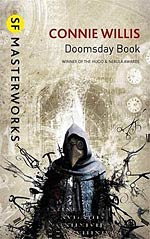
![]() Darling
Darling
3/23/2012
![]()
Kivrin goes back in time to the Middle Ages under the supervision of her mentor Mr. Dunworthy. At the same time she arrives a new strain of flu strikes her world, upsetting the whole balance of time-travel supervision and endangering her in the period she is studying. The twists and turns along the way are the point of the story, so I won't tell you those, but if you read the book, I think you will be as surprised as I was by them.
Willis' book is a grand pilgrimage into contemporary perspective, which is, after all, the only point of a time-travel story. Kivrin and Dunworthy, today's anchor points in the Middle Ages show us that the changes over the centuries in medicine, psychology and technology have not softened the great question of why there is suffering in the world. Our ancestors sought to lay blame, we seek a medical solution, but neither can adequately come to terms with the problem. Many have said that Science Fiction is a literature of ideas.
This usually is an excuse for poorly developed characters. Willis does not make that mistake. Dunworthy, Kivrin, Roche, Agnes, Colin (and even the "Gallstone") are wonderfully painted in dynamic dimension. At the same time, her tech devices, a jacket that "strips" itself and, of course, the Net that makes time travel possible are sufficiently described from the perspective of those who don't need an explanation. Thus we see the impressions of the devices without the details and, after all, we don't really need them. This is where hard Science Fiction is going, away from the techno babble of engineering junkies. That element is clearly still important and well developed in Doomsday, but it fades into the background, into the mythology of the story. Instead, for Willis at least, the bigger picture is important. What will happen when we can send people into the past and learn first hand about the seminal events of history? How will what we know be affected by who we know?
I like how Willis treats Christian faith in her book. It was such an integral part of the Middle Ages and still exerts important influence on English society, and so, she does not, in classic SF fashion, relegate it to the realm of ridicule, or perhaps worse, ignore it. Instead her characters live with it woven into the fabric of their personalities to varying degrees, aware of the Bible, of various religious traditions, and of the tricky line between faith and superstition. Willis ferociously judges the fanatical while maintaining respect for the integral faithful, all the while laughing at the folly of a religion overzealous to find relevancy and popular appeal. In the Middle Ages it was with drunken partying in the town square, today it is in the tinny, electronic, lower-cost copies of bell towers and festival lights. And yet, there is a Father Roche here and there among us: faithful, honest, devout, and working hard.
I see why Doomsday did so well with the awards folks, it is a tale well told; but I must say that Willis seems to be bitten by the same bug as many current writers. What has happened to the story tellers who can work with economy and whimsey? Why must all our writers write tomes? Books are entertainment, after all. If you are going to write a book the length of Moby Dick, it should darn well give the payout of Moby Dick, or at least make an honest effort. In the end, though, I think writers take themselves too seriously, imagining that all their work is of amazing value. The Time Machine by H.G. Wells was a great story, and quite short. I have nothing against long books per se, but the more books released that take a long time to read, the fewer I can get through. At times Doomsday moved too slowly for the payoff, lots of buildup that ended up making the reader wish she would just get to it already. Is a long book an author's way of holding her readers close to her for a longer time?
Enough of that rant. "Holding close" is part of the point of the story too. What are we as people without each other? The basic humanity necessary to weather a crisis, even a catastrophic crisis includes not just caring for the victims but tolerating those who do not cope well. The two timeframes had interesting analogues: the scholar protagonist, the doomed healer/ helper, the abrasive fanatic, and the wide-eyed child. These and other characters mingle to form the core of microcosms of larger societies beset by tragedy. Heisenburg's uncertainty, unmentioned by Willis, is everywhere and vastly turned on its head. Observation does not only change the subject, it changes the observer. In this case, it tears and scars and the reader is left at the end still wondering about the extent of the damage.
I recommend Doomsday to anyone who likes time travel, who likes stories told from two perspectives, who likes honest characters who deal with life and also deal with denial. I love the struggles of Dunworthy and Kivrin. I love how they wrestle with what they know and what they wish. I love how their very human attachments mar their judgement and bruise their spirits. That is, after all, who I am. I am a man with a spirit, who knows many things and a good many people. Those people constantly pull and tear at what I know, reshaping it and challenging its boundaries, forcing me to dream of a world where what I feel is not limited by an unbendable reality.